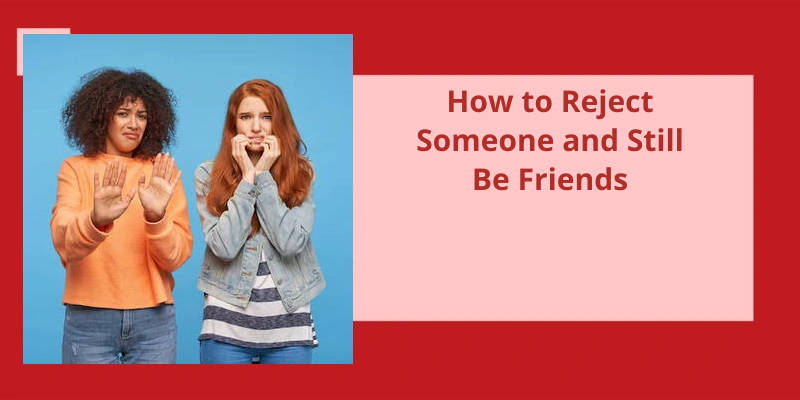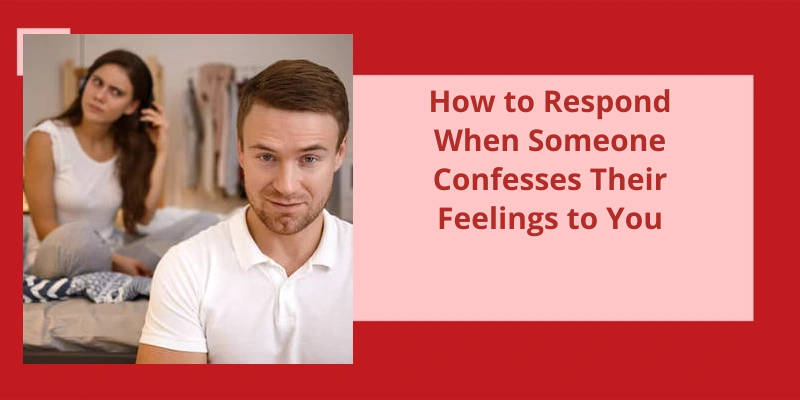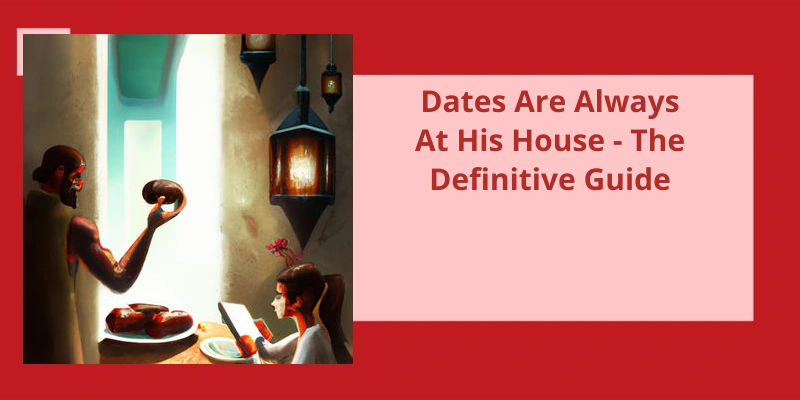I believe it's important to be honest with you about my feelings, as difficult as it may be. I want you to know that I’m genuinely flattered by the attention you've given me recently, and I truly appreciate your kind gestures. However, I feel it’s necessary to make it clear that I don’t share the same romantic interest in you. I want to emphasize that this decision is in no way a reflection of your character, as I genuinely think you’re a wonderful person. Hence, I hope we can still maintain a close and meaningful friendship despite this difference in feelings.
Should You Be Friends With a Girl After Rejection?
When faced with the dilemma of whether to maintain a friendship with someone after rejection, it’s important not to dismiss the idea of friendship altogether. Instead of cutting ties completely, consider the possibility of establishing a new dynamic with this person. By handling the rejection in a mature and respectful manner, you can create a foundation for a meaningful and lasting friendship.
Communicate openly and honestly with the person about your feelings and intentions. Let them know that you value their friendship and would like to continue being a part of their life, even if the romantic aspect didnt work out. Be clear about your boundaries and expectations for the friendship, ensuring that both parties are on the same page.
It’s also crucial to give yourself some time and space to heal and process your emotions. Allow yourself to feel the disappointment, but also be open to the idea of moving forward and creating a new kind of connection with this person.
In addition, it’s important to avoid dwelling on what could have been or holding onto any lingering romantic feelings. Recognize that the person you were interested in may not feel the same way, but that doesn’t diminish their worth as a friend or the potential for a meaningful relationship without romantic involvement.
By shifting your focus from the romantic aspect to building a solid friendship, you can explore new avenues of connection and enjoy each others company in a different way. Remember that friendship can bring it’s own unique joys and benefits, and by embracing this new chapter, you might discover a lasting and fulfilling bond.
Lastly, keep in mind that not all rejections lead to successful friendships, and thats okay too. Respect the other persons decision if they feel more comfortable maintaining distance or if the rejection has caused too much discomfort. Accepting their choice gracefully and without resentment is vital for the well-being of both parties involved.
Setting Boundaries and Expectations for a Friendship After Rejection.
Setting boundaries and expectations for a friendship after rejection is an important step in maintaining a healthy and respectful relationship. It’s crucial to communicate openly and honestly about your feelings and desires, ensuring both parties are on the same page moving forward. This might involve discussing new boundaries or limitations to avoid any potential misunderstandings or discomfort. Being understanding and giving each other space can help preserve the friendship while allowing both individuals to heal and move forward.
Navigating the delicate balance between rejection and maintaining a friendship can be challenging, especially when it comes to rejecting a friend who desires a romantic relationship. It’s crucial to approach the situation with empathy, kindness, and honesty. By highlighting the other person’s admirable qualities, expressing gratitude for the connection you shared, and sincerely wishing them well, it’s possible to reject someone while still preserving the friendship bond.
How Do You Reject Someone and Keep a Friendship?
When it comes to rejecting someone and still maintaining a friendship, being kind and encouraging is absolutely crucial. The last thing you want is to hurt the other person or make them feel inadequate. Instead, let them know that they’re a wonderful individual who just wasnt the right match for you. Mention their great qualities and reassure them that they’ll undoubtedly find someone amazing who appreciates them fully.
Expressing gratitude is an important aspect of rejecting someone and remaining friends. Thank the person for giving you the opportunity to get to know each other and for the experiences you shared. Emphasize that you value the time you spent together and the memories you created. This will show them that you truly appreciate their presence in your life, even if romance isnt in the cards.
When dealing with a friend who wants to be more than friends, it’s crucial to handle the situation with extra care. Acknowledge their feelings honestly but gently, and let them know that you value the friendship you already have. Assure them that you treasure their presence in your life and don’t want to jeopardize the special bond you share. While it may be uncomfortable, honest communication is vital in navigating this delicate situation.
Offering your best wishes is a beautiful way to conclude the conversation. Let the other person know that you genuinely want them to be happy and find the love they deserve. It’s important to remind them that rejection doesn’t diminish their worth or chances of finding someone special—it simply means you werent the right fit. Encourage them to keep their heart open and trust that the right person will come along when the time is right.
Assure the other person that they’re a wonderful individual who just wasnt right for you, and offer your best wishes for their future happiness. Handling the situation delicately is crucial, particularly when rejecting a friend who wants more. Remember, above all, to be respectful and considerate of the other persons feelings throughout the process.
How to Initiate the Conversation About Rejecting Someone and Maintaining a Friendship
Initiating a conversation about rejecting someone while still maintaining a friendship can be uncomfortable, but it’s important to approach the situation with honesty, compassion, and empathy. Start by finding a suitable time and place to talk privately, ensuring that both parties feel comfortable and respected. Clearly express your feelings, emphasizing that your decision isn’t a reflection of their worth or value as a person, but rather a matter of personal compatibility or circumstance. Be prepared for a range of reactions and emotions from the other person, and try to actively listen and validate their feelings.
Suggest the possibility of maintaining a friendship, but also be understanding if they need time and space to process their emotions. Reassure them that you value their friendship, but respect their wishes if they need distance or time apart. It’s crucial to maintain open lines of communication and check in with each other periodically to ensure that both parties are comfortable and have adjusted to the new dynamics of the relationship. Remember, maintaining a friendship after rejection requires effort, patience, and understanding from both sides, and it’s okay if the friendship evolves or changes over time.
When it comes to rejecting someone gracefully, there are a few strategies you can employ depending on the situation and your relationship with the person. Being clear and honest, though perhaps blunt, can help to convey your message effectively. Another approach is to try complimenting them while still being firm in your rejection. It’s important not to apologize excessively, but rather to explain your reasoning calmly and respectfully. Remember to appreciate the time you’ve spent with them, and avoid keeping them waiting for your response. Ultimately, it’s about finding a balance between being sweet and firm in your rejection.
How Do You Reject Someone Gracefully?
When it comes to rejecting someone gracefully, there are various approaches you can take depending on the situation and your relationship with that person. The key is to be clear and honest, as this will prevent any misunderstandings or false hope.
One way to reject someone politely is by being direct and blunt. While it may seem harsh, it’s better to be straightforward and avoid any confusion. By clearly stating your feelings or intentions, you give the other person a clear understanding of where they stand with you.
Another approach is to try complimenting the person. While you may not feel romantically interested, you can still acknowledge their positive qualities and appreciate their efforts. This can soften the blow and show that you value them as an individual, even though you don’t see a romantic future together.
It’s important to refrain from apologizing excessively when rejecting someone. While it’s natural to feel sorry for hurting someones feelings, apologizing excessively can give mixed signals and may give the impression that there’s a chance for things to change in the future. Instead, express your gratitude for their interest and honesty, and emphasize that it’s about compatibility rather than any personal shortcomings.
Explaining your side can also be helpful in rejecting someone gracefully. By sharing your thoughts and reasoning, you provide them with insight into your perspective and avoid leaving them guessing. This can lead to a more respectful and understanding conversation, helping to maintain a level of friendship, if desired.
Lastly, it’s important to appreciate the time spent with the other person, regardless of the outcome. Acknowledge the moments shared, the experiences gained, and the lessons learned. Showing gratitude for the past can help ease any potential tension or hurt feelings while reinforcing that the decision to reject isn’t a reflection of their worth as an individual.
In all situations, it’s crucial not to keep the other person waiting. Delaying or avoiding the rejection can only prolong their confusion and prevent them from moving on. If you know that a romantic relationship isn’t in the cards, address the issue directly and timely. By doing so, you allow both parties to move forward and potentially maintain a meaningful friendship, if that’s a mutual desire.
How to Reject Someone Gracefully When You Are Not Interested in a Friendship.
- Be honest and open-hearted with the person
- Express gratitude for their interest in becoming friends
- Explain your current priorities and commitments
- Assure them that it’s not personal and it’s about your own needs
- Suggest staying acquaintances or being friendly in casual interactions
- Offer alternative ways of socializing or connecting with others
- Avoid leading them on or giving false hope
- Listen to their feelings and concerns
- Respect their reaction and give them time to process
- Keep it polite, kind, and considerate throughout the conversation
Source: How To Reject Someone Politely: 16 Ways To Do It
When it comes to rejecting someone, it’s important to approach the situation with honesty and empathy. Instead of giving false hope or avoiding the conversation, being upfront and direct can be the kindest way to reject someone. By preparing yourself, conducting the conversation face-to-face, and using “I” statements to express your feelings, you can humbly reject someone while respecting their emotions. It’s essential to remember that what you’re feeling is normal and to avoid putting off the conversation. In this article, we’ll delve deeper into seven ways you can reject someone nicely.
How Do You Humbly Reject Someone?
When it comes to rejecting someone while still maintaining a friendship, it’s important to tackle the situation with honesty and humility. One of the key ways to go about this is by being honest about your feelings or lack thereof. Expressing your authentic emotions and reasons for not reciprocating someones feelings can help them understand and accept the rejection without feeling personally attacked.
While preparing yourself emotionally before the conversation is crucial, it’s equally important to anticipate the other persons response. Understand that they may feel hurt or disappointed, and be prepared to offer support and empathy during this difficult time. This shows that you value their feelings and are committed to preserving the friendship.
Opting for a face-to-face conversation rather than a text or phone call is another crucial aspect of rejecting someone with humility. This approach allows for clear communication and the opportunity to convey your message with sincerity. It also demonstrates respect for the other person by giving them a chance to react and ask questions.
Sticking with “I” statements during the conversation can help ensure that your rejection is seen as your personal decision rather than a judgment or criticism of the other person. This language choice promotes understanding and avoids placing blame or making the rejected individual feel inadequate.
Recognize that feeling a sense of guilt or apprehension is normal in such situations. Rejection is never easy, but acknowledging your own emotions can help you approach the rejection process with empathy and compassion. By accepting and validating your own feelings, you can maintain a sense of authenticity throughout the conversation.
Avoiding the temptation to procrastinate or put off the rejection is essential. Delaying the conversation can often lead to false hope for the other person, potentially causing more pain and confusion in the long run. Therefore, it’s crucial to address the situation promptly and honestly. This allows both parties to move forward and potentially maintain a friendship in a healthy and respectful way.
Setting Clear Boundaries and Expectations in Friendships
Setting clear boundaries and expectations in friendships is essential when it comes to maintaining healthy relationships and avoiding misunderstandings or hurt feelings. When rejecting someone and trying to remain friends, it’s crucial to communicate your boundaries openly and honestly.
Start by expressing your appreciation for the person and the genuine connection you share. Then, kindly explain why you aren’t interested in pursuing a romantic relationship or any other type of involvement beyond friendship. Be clear about your feelings and intentions without being harsh or hurtful.
It’s also important to establish clear expectations moving forward. This could include discussing how you both would like to navigate the friendship and any adjustments that may be necessary. It may be helpful to address any potential discomfort or awkwardness that may arise and emphasize your desire to maintain a positive and supportive connection.
Remember, while rejection is never easy, being honest and upfront about your boundaries is ultimately respectful to both yourself and the other person involved. With open communication and mutual understanding, it’s possible to reject someone and still maintain a valuable friendship.
The fear of getting hurt again can be a powerful deterrent when it comes to remaining friends with someone who’s rejected you. Moving on from someone becomes much more challenging when they’re still a constant presence in your life, leading some guys to choose the option of cutting ties altogether.
Why Doesn’t He Want to Be Friends After I Rejected Him?
When someone rejects a romantic advance, it can be a blow to the ego and a reminder of ones vulnerability. This can create a fear of getting hurt again, which may be the reason why he doesn’t want to remain friends. It’s difficult to fully move on from someone when theyre still present in your life. Every interaction, every conversation can serve as a painful reminder of what could have been, deepening the emotional wounds.
Additionally, it’s natural for individuals to need some space and time to heal after rejection. Remaining friends immediately after a rejection may not allow for this necessary healing process. Cutting ties altogether can create an emotional distance that gives him the opportunity to heal and move on more effectively.
Furthermore, the rejected individual may feel a sense of pride and self-worth that prevents them from accepting a friendship with someone who rejected them romantically. They may not want to settle for less than what they initially desired, and they believe that remaining friends would be compromising their self-respect.
In some cases, the rejected person may be concerned about potential awkwardness or mixed signals that could arise from maintaining a friendship. They fear that any friendly gesture or interaction could be misconstrued as romantic interest, leading to confusion and further pain. In order to avoid these uncomfortable situations, they may choose to sever ties completely.
Lastly, it’s worth considering that everyone handles rejection and relationships differently. While some individuals may be open to a friendship despite being rejected, others may have a harder time accepting this arrangement. It’s important to respect their decision and give them the time and space they need to heal, even if it means accepting that friendship might not be possible in this situation.
Tips for Managing Awkwardness and Potential Mixed Signals in a Post-Rejection Friendship.
- Give yourself time to process the rejection.
- Communicate openly and honestly about your feelings.
- Set clear boundaries and discuss expectations.
- Try to understand each other’s perspectives.
- Focus on developing a platonic relationship.
- Find common interests and activities to bond over.
- Avoid discussing past romantic feelings or relationships.
- Be supportive and celebrate each other’s successes.
- Take breaks if needed to maintain emotional well-being.
- Consider seeking professional help if necessary.
How to Politely Tell Someone You Don T Want to Be Friends Anymore?
Instead, suggest that you both would be better off pursuing friendships with people who share similar interests and values. Remind them that it’s important to surround ourselves with individuals who make us happy and uplift us, and that doesn’t always mean we can be friends with everyone.
Another approach could be expressing that due to personal circumstances or priorities shifting, you find it challenging to devote the time and energy necessary for a fulfilling friendship. Assure them that this decision isn’t a reflection of their worth or compatibility as a friend, but rather a reflection of your current circumstances. Encourage them to seek out connections with others who’re better suited to provide the friendship they deserve.
It can also be helpful to emphasize the importance of honesty and open communication in any relationship, highlighting that pretending to be friends out of obligation would ultimately be unfair to both parties involved. Explain that by being honest about your feelings, you’re giving them the opportunity to cultivate connections with others who genuinely appreciate and value them.
While it’s important to be direct, it’s equally important to approach the conversation with empathy and understanding. Reassure them that you understand if they need time or space to process the situation, and encourage them to reach out if they ever want to talk further. Leaving the door open for future conversations or interactions can help soften the blow and potentially pave the way for a more amicable resolution.
Remember, rejection is always difficult, and it’s natural for the other person to experience some hurt or disappointment. However, by approaching the conversation with kindness, honesty, and empathy, you can minimize the potential damage to your relationship and, perhaps, even maintain a respectful and amicable connection despite the change in dynamics.
Recognizing Toxic Friendships and How to End Them
- Feeling constantly drained after spending time with this friend
- Experiencing frequent criticism or put-downs
- Being manipulated or guilt-tripped into doing things
- Not feeling supported or valued in the friendship
- Dealing with jealousy or competitiveness
- Experiencing a lack of trust or betrayal
- Being taken advantage of or used
- Feeling anxious or fearful around this friend
- Recognizing patterns of disrespect or boundary violations
- Losing interest or enthusiasm in the friendship
- Noticing a negative impact on your self-esteem or well-being
- Considering the possibility of ending the toxic friendship
- Reflecting on your own needs and priorities
- Talking to a trusted confidant or therapist for support
- Communicating your feelings and concerns with the friend
- Setting and enforcing boundaries with this friend
- Taking a break or distancing yourself temporarily
- Making new connections and nurturing healthier friendships
- Learning from the experience and growing emotionally
- Focusing on self-care, personal growth, and well-being
- Acknowledging that ending a toxic friendship can be difficult but necessary for your happiness
Conclusion
However, I value our friendship and I don't want to lose that. It's important to communicate honestly and kindly about our feelings, and I believe that we can navigate this situation in a way that maintains our bond. Being rejected is never easy, but if we both approach it with respect and understanding, we can still be there for each other as friends. It might take time to adjust and rebuild our dynamic, but the foundation of our friendship can withstand this. Let's focus on cherishing the connection we’ve built and continue supporting each other in different ways.






